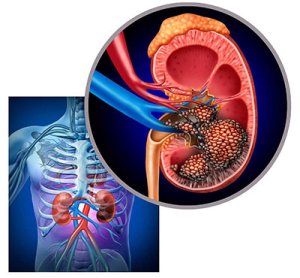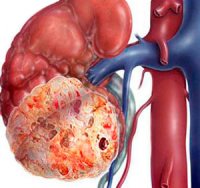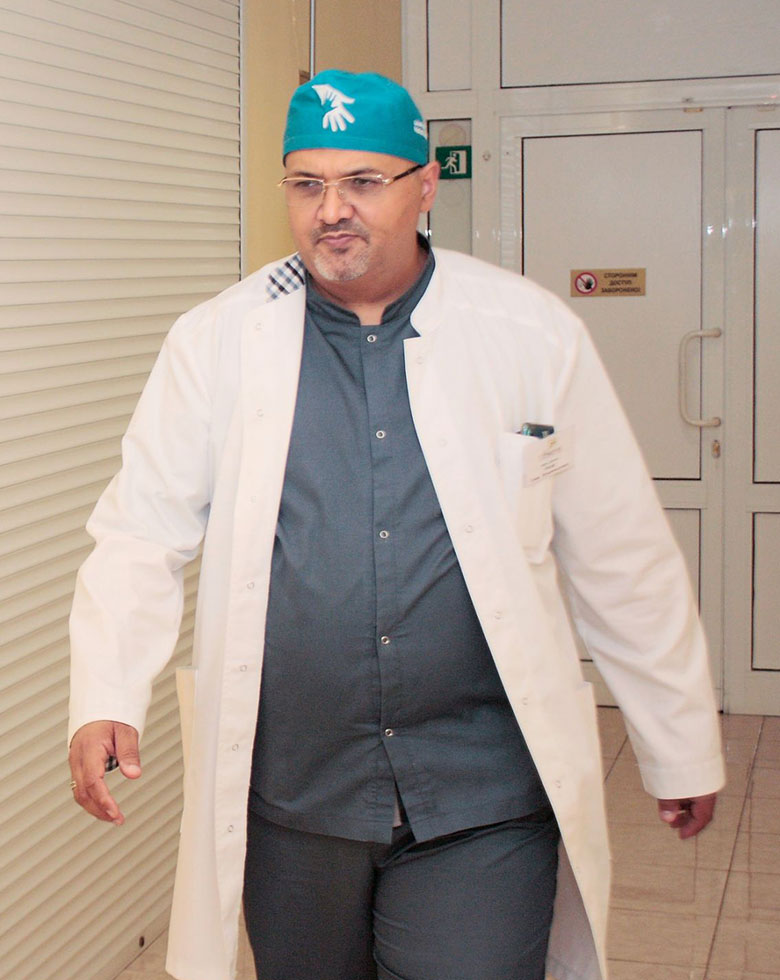ADDRESS:
Degtyarevskaya st., 48
Kyiv
RECEPTION OF PATIENTS:
Mon-Fri 8:00-18:00
Sat 9:00-18:00
Menu
ADDRESS:
Degtyarevskaya st., 48
Kyiv
RECEPTION OF PATIENTS:
Mon-Fri 8:00-18:00
Sat 9:00-18:00
Home » Kidney cancer – surgical treatment

The kidneys are two bean-shaped organs, each about the size of a fist. They are located in the abdomen retroperitoneally on both sides of the spine in the area of the kidneys on the sides of the two lower thoracic and two upper lumbar vertebrae. Their main job is to clean your blood, remove waste products and produce urine, that is, to maintain the body’s chemical homeostasis.
Kidney cancer is a disease caused by the growth of one of several types of malignant cancer.
Renal cell carcinoma is localized in the kidney itself, develops from the epithelium of the collecting tubules in the kidney tissue, and comprises 90% of what people call kidney cancer.
Transitional cell carcinoma appears outside the tissue of the kidney itself in the area of the transition to the ureter, which drains urine into the bladder, and arises from the epithelium of the cup-loaf system. This pathology is more reminiscent of bladder cancer than renal cell carcinoma.
Renal sarcoma originates in the connective tissue of the kidney and is much less common than renal cell carcinoma.
Nephroblastoma (Wilms tumor) is a highly malignant form of kidney cancer that originates from the tissue of the developing kidney in the fetal period and manifests itself in children up to the age of five.
Oncocytomas are benign kidney tumors. Over time, they can become malignant and are currently treated as if they were malignant tumors, meaning they should be surgically removed as soon as possible.
There is no way to distinguish on ultrasound or computer tomography from malignant tumors when they are found in the kidney!
The good news is that most kidney cancers are caught before they spread (metastasize) to distant organs.
And the treatment of kidney cancer detected at an early stage is easier and more successful. However, these tumors can grow to quite large sizes before they are detected.
According to the latest, most common classification, based on morphological, cytogenetic and molecular studies, as well as immunohistochemical analysis, 5 types of renal cell cancer are distinguished:
Modern medicine singles out several main reasons that provoke the development of kidney cancer:
Important. Despite the differences in the structure of the genitourinary system, the causes of kidney cancer in men and women are identical.
Surgical treatment of kidney cancer — clinic of progressive medicine AVICENNA MED.

In the early stage, kidney cancer usually does not show any symptoms and is very often diagnosed by chance when the patient undergoes an examination of the abdominal organs on a computer tomography or during an ultrasound examination.
When the cancer progresses or metastasizes (spreads beyond the kidney), a certain range of symptoms appears: pain in the side or back above the lumbar region and is felt as pain “in the depths”. This pain differs from superficial pains associated with muscles or damage to the intervertebral discs in the lower thoracic or lumbar region of the spine by its depth of origin, constant nature (not “shooting”), varying intensity (from slight to moderate or severe pain).
Visually appears blood in the urine (pink or red coloration of the urine, the appearance of blood streaks in the urine).
In some cases, kidney cancer can cause other systemic disorders remotely related to the primary tumor: night sweats, recurrent fever (increase in body temperature above 380C several times a day), weight loss, high blood pressure (BP more than 135-140/ 90 mm Hg), the appearance of anemia (paleness of the skin and mucous membranes, according to the general blood test – a decrease in hemoglobin less than 100-110 g/l, an increase in the sedimentation rate of erythrocytes – more than 20 mm/h), changes in the biochemical blood analysis in the form of increase in liver enzymes.
The following symptoms should look suspicious:
Kidney cancer is diagnosed on average at the age of 54. Men are twice as likely to be affected as women. If you experience any of the above symptoms and you are over 50 years old, come to our clinic for an ultrasound examination of the organs of the abdominal cavity, pelvis and retroperitoneal space, followed by a free consultation.
The main and most effective method of fighting kidney cancer. Even the presence of single metastasizing elements is not a contraindication for surgery. The type of surgical intervention is selected based on the specifics of the development of the pathology in each individual case.
A practical case of an operation – laparoscopic resection of the right kidney</a >
Such treatment methods are used selectively for appropriate indications. Radiotherapy and polychemotherapy are relevant only as palliative methods (which ease the course of the disease in inoperable patients). Immunotherapy with a monoclonal antibody – nivolumab gives a positive result only in the treatment of clear cell metastatic renal cell cancer and is used to a limited extent in the form of an expensive drug.
The main prevention of the development of kidney cancer is the rejection of bad habits, as well as the exclusion of contact with chemicals such as asbestos, cadmium and others. The presence of chronic kidney diseases is also not a sentence and should be monitored by the patient himself in the form of preventive examinations.

Operations are performed by the best surgeons of the clinic.
Surgeon, oncologist, endoscopist, doctor of the highest category, candidate of medical sciences.
More than 20 years of experience.
RECEPTION OF PATIENTS:
Mon-Fri 8:00-18:00 | Sat 9:00-18:00
ADDRESS:
Degtyarevskaya st., 48, Kyiv
The use of content and photo materials of the site without the consent of the copyright holder is not allowed!
License – order of the Ministry of Health of Ukraine dated June 1, 2017. No. 592
License for Dentistry – order of the Ministry of Health of Ukraine dated December 15, 2022 No. 2270
© 2023 | AVICENNA MED – center for Pronovative Medicine. Kyiv, Ukraine
RECEPTION OF PATIENTS:
Mon-Fri 8:00-18:00 Sat 9:00-18:00
ADDRESS:
Degtyarevskaya st., 48, Kyiv
License – order of the Ministry of Health of Ukraine dated June 1, 2017. No. 592
License for Dentistry – order of the Ministry of Health of Ukraine dated December 15, 2022 No. 2270
The use of content and photo materials of the site without the consent of the copyright holder is not allowed!
© 2023 | AVICENNA MED – center for Pronovative Medicine. Kyiv, Ukraine